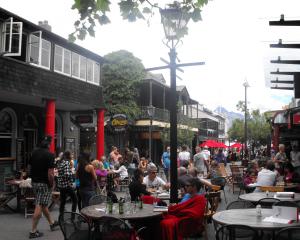The first rise in monthly guest nights in Queenstown since the Christchurch earthquake in February last year is "encouraging", but uncertainties in global tourism remain, which could affect the resort's prosperity in 2012.
Destination Queenstown chief executive Tony Everitt was asked to comment yesterday when Statistics New Zealand released its commercial accommodation monitor for the resort in November last year, the month which ushered in the critical peak summer season.
Results revealed a 5% year-on-year increase in Queenstown guest nights for November.
Hotels had the largest increase, followed by backpackers, while motels had the only decrease.
The resort's increase contrasted with a national decline of 1.5% for the month.
Domestic guest nights in Queenstown were up a significant 36.6% to 68,232. The average length of stay rose from 2.25 nights to 2.30 nights.
The overall occupancy rate rose from 49.6% to 51.3%, while the occupancy rate, excluding holiday parks, was 56.8%. Accommodation capacity, excluding holiday parks, was up 4.2%.
Nationally, Wellington recorded the largest increase in guest nights in November compared with the month in 2010, up 16,000 or 8.1%, followed by Queenstown, up 9000 or 5%, Dunedin, up 9000 or 13.3%, Timaru, up 8000 or 42.1%, and Wanaka, up 6000 or 15.6%.
Canterbury recorded the sharpest decrease in guest nights, down 91,000 or 25.3%.
Mr Everitt said it was good to see some "steadiness" return to Queenstown's tourism and the indication of a pick-up in market share.
Asked what factors he put the slight return to form down to, he said the 850-member businesses "dug deep in 2011, looked after their customers and marketed harder, including Destination Queenstown."
The intervening summer months had been "steady" anecdotally for operators, but it was almost a day-by-day situation, he said.
"We're not out of the woods yet, because Europe has always been a very important market for Queenstown and business directly from that continent at the moment is a bit fragile.
"We're not sure if that economic uncertainty will spill over and start to impact on some of our other markets that are doing better, like Asia and even the United States."
In November 2011, international guests accounted for 64.8% of all guest nights in Queenstown, down 6.7% to 125,745 the previous November.
Mr Everitt said the "very strong" increase in domestic tourism more than offset the decline in overseas tourism in November, although the majority of tourism was from overseas.
"I think we can put that down to the New Zealand economy being maybe a little bit more robust than others out there, even though we think we have some issues of our own.
"The strength in the dairy sector, that money's eventually going to feed through into leisure, and the strength of some of the micro-economies like Auckland, which seemed to do very well out of the Rugby World Cup.
"That has a secondary impact for us if they're doing well, and the trend continues of improved access to the resort with increasing flights into Queenstown, although these figures pre-date the Wellington service just before Christmas."
Mr Everitt said DQ still urged caution for tourism operators and it remained a time to focus on core businesses. Last year was a tough year and the hope was the November figures were a sign the decline had bottomed out, he said.
Asked what was needed to fan the flame of recovery, Mr Everitt said DQ would continue with all its international marketing and promotion strategies in the hope economic conditions will improve in 2012.
"It's important we all get behind these new domestic services, like Jetstar from Wellington, and the key thing is to keep up markets and look after customers."
Advertisement






